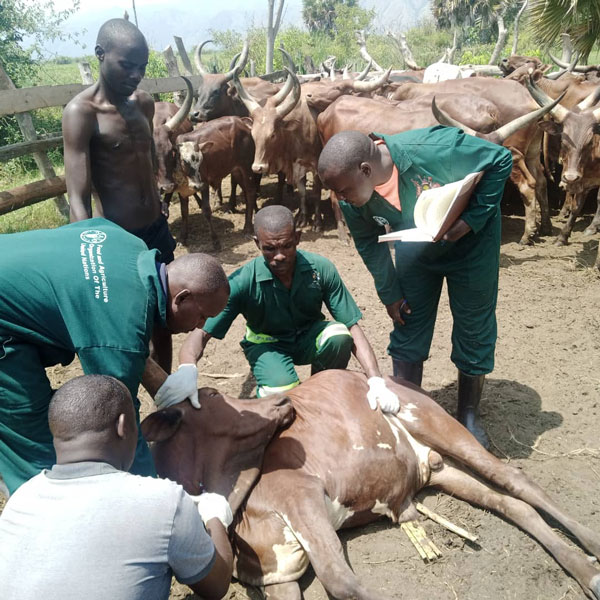
Kampala, Uganda | THE INDEPENDENT | The Ministry of Agriculture, Animal Industry and Fisheries (MAAIF) is considering lifting the Foot and Mouth Disease (FMD) quarantine on livestock.
On February 28th, the Ministry imposed quarantine restrictions in Kampala following an outbreak of FMD in Kabowa, Rubaga Division. Subsequently, the disease spread to over 30 districts across the country, including Ssembabule, Luwero, Mubende, Gomba, Isingiro, Kazo, Kiruhura, Kyotera, Lwengo, Fort Portal, Rakai, Ngora, Kibuku, Bukedea, Butaleja, and Mbarara.
Dr. Anna Rose Ademun, Commissioner of Animal Health at MAAIF, told URN in an interview on Wednesday that the disease has been contained following the ongoing livestock vaccination exercise, and the Ministry is contemplating lifting the quarantine this month (July) if no new cases are reported.
Notably, the quarantine temporarily halted the movement of cattle, goats, sheep, pigs, and their by-products, significantly impacting businesses.
Amos Tindyebwa, proprietor of Fresh Cuts Limited, a meat processing company, expressed frustration over stringent restrictions by local and international markets, particularly in the Middle East and North Africa, despite FMD not posing a public health or food safety threat.
In response, Dr. Ademun explained that while the World Health Organization confirms FMD is not a threat to food safety or public health, consuming meat from healthy animals is a good practice.
She emphasized that an FMD outbreak would severely impact susceptible animals and the economy by reducing agricultural productivity and causing suffering to infected animals.
The FMD outbreak also delayed the implementation of Executive Order Number 3, issued by President Yoweri Kaguta Museveni in May 2023. This order aimed to address illegal land acquisition by Balaalo migrant cattle keepers in Northern Uganda, who are also accused of environmental injustices.
The government’s announcement follows concerns raised by transboundary traders about the crisis caused by FMD. The 3rd Private Sector Meeting of the Intergovernmental Authority on Development (IGAD) importing and Middle East and North Africa (MENA) exporting regions convened this week in Uganda to enhance livestock and meat trade and investment.
The 3rd Private Sector Meeting was followed by the 7th Inter-regional regulatory bodies meeting on Wednesday, organized by the IGAD Centre for Pastoral Areas and Livestock Development (ICPALD) under the theme “Strengthening Collaboration for Enhanced Trade in Live Animals and Meat.”
Dr. Ricarda Mondry, Livestock Development Officer at the Food and Agriculture Organisation (FAO) Sub regional Office for Eastern Africa, explained that the meeting brought together regulatory body officials, exporters, importers, and Chief Veterinary Officers (CVOs) from IGAD countries, Saudi Arabia, Oman, Egypt, and UAE to deliberate on comprehensive livestock trade compliance and harmonizing laboratory test methods, among other issues.
FAO contends that beyond providing food and other goods and services such as manure and draft power, the livestock sector contributes between 1 and 1.5 percent to Uganda’s export trade value in livestock products and live animals.Livestock is a significant economic, social, and cultural facet of life for over 250 million people in the IGAD region, which includes Djibouti, Ethiopia, Kenya, Somalia, Sudan, and Uganda.
The region exports live animals and meat to MENA countries, meeting about 50% of the demand for live animals and 10% for meat annually. The IGAD region has approximately 520 million livestock, of which 242 million (35%) are small ruminants.
***
URN
 The Independent Uganda: You get the Truth we Pay the Price
The Independent Uganda: You get the Truth we Pay the Price


